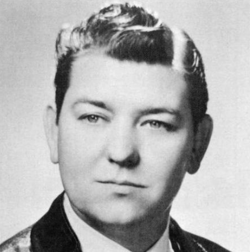
Ace Cannon
John "Ace" Cannon (born 5 May 1934 in Grenada, Mississippi) is an American tenor and alto saxophonist. He played and toured with Hi Records stablemate Bill Black's Combo, and started a solo career with his record "Tuff" in 1961, using the Black combo as his backing group. "Tuff" hit #17 on the U.S. Billboard Hot 100 in 1962, and the follow-up single "Blues (Stay Away from Me)" hit #36 that same year. In April 1965, he released Ace Cannon Live (HL 12025); according to the liner notes by Nick Pesce the album was recorded in front of a live audience inside Hi's recording studio, and Pesce claims this was the first time such an album had ever been recorded (as opposed to previous live albums recorded in concert venues).
Cannon was inducted into both the Rock and Soul Hall of Fame and the Rockabilly Hall of Fame in 2000. In May 2007, his hometown of Calhoun City, Mississippi, hosted its first annual Ace Cannon Festival, and on December 9, 2008, he was honored with induction into the Mississippi Musicians' Hall Of Fame.
The Lonesome Road
"The Lonesome Road" is a 1927 song with music by Nathaniel Shilkret and lyrics by Gene Austin, alternately titled "Lonesome Road", "Look Down that Lonesome Road" and "Lonesome Road Blues." It was written in the style of an African-American folk song.
The lyricist and composer were both extremely popular recording artists. Gene Austin estimated he sold 80 million records, and Nathaniel Shilkret's son estimated his father sold 50 million records. Joel Whitburn lists recordings by Austin, Bing Crosby, Ted Lewis, and Shilkret (see list of recordings below) as being "charted" at Numbers 10, 12, 3 and 10, respectively. There are no reliable sales figures that can be used to verify or dispute any of the estimates above.
Use in film and live performances
The composition was notably used as a substitute for Ol' Man River in the finale of the part-talkie 1929 film version of Edna Ferber's novel Show Boat. It was performed onscreen by Stepin Fetchit as the deckhand Joe. Fetchit's singing voice was supplied by bass-baritone Jules Bledsoe, who had played Joe in the original stage version of the musical. The Shilkret autobiography contains a brief account of the motivation for using the song in the film.
Podcasts:
Ace Cannon
ALBUMS
- Help Me Make It Through The Night released: 1969
- Golden Classics released:
- Tuff Sax & Moaning Sax released:
- The Misty Sax Of Ace Cannon + Memphis Golden Hits released:
- Ace Cannon Plays Gold Favorites released:
- 16 Greatest Hits released:
- For the Good Times released:
Tuff Sax & Moaning Sax
- Tuff Sax
- Trouble in Mind
- St. Louis Blues
- Wabash Blues
- Basin Street Blues
- Cannon Ball
- Blues in My Heart
- Blues Stay Away From Me
- The Lonesome Road
- Careless Love
- Kansas City
- I've Got a Woman
- Moanin' the Blues
- Trouble in Mind (version 2)
- Prisoner's Song
- I Love You Because
- Last Date
- Singing the Blues
- It's All in the Game
- No Letter Today
- I Left My Heart in San Francisco
- I Can't Get Started With You
- Prisoner of Love
- Moanin'
The Misty Sax Of Ace Cannon + Memphis Golden Hits
- Wonderland by Night
- Almost Persuaded
- Somewhere My Love
- Blowing in the Wind
- As Time Goes By
- Yesterday
- When a Man Loves a Woman
- Strangers in the Night
- You'll Never Walk Alone
- That's My Desire
- Summertime
- Michelle
- Last Night
- Wooly Bully
- Haunted House
- Raunchy
- 20 - 75
- Green Onions
- Tuff
- Walking the Dog
- In the Midnight Hour
- Baby, Let's Play House
- White Silver Sands
- I Walk the Line

-
by Ace Cannon
-
by Ace Cannon
-
by Ace Cannon
-
by Ace Cannon
-
by Ace Cannon
-
by Ace Cannon
-
by Ace Cannon
-
by Ace Cannon
-
by Ace Cannon
Cottonfields
by: Ace CannonIn them ol' cotton fields back home
In them ol' cotton fields back home
In them ol' cotton fields back home
In them ol' cotton fields back home
